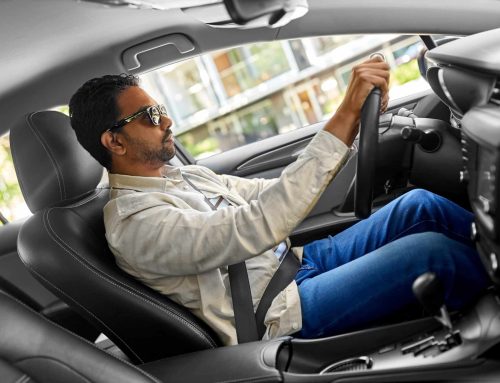Driving can feel like one of the most stressful situations we encounter, and there’s research to back that up. One study from the Massachusetts Institute of Technology (MIT) found that certain driving situations rank high on the stress meter when compared to other daily activities.
If this is how you feel when you’re in the driver’s seat, then you may be wondering how to make driving a more enjoyable experience. After all, high levels of stress can cause physical symptoms (like rising blood pressure) and emotional reactions that may be unsafe.
Here are some common reasons for feeling stressed by driving and what you can do about them.
You feel inexperienced, uncomfortable or fearful behind the wheel
Sometimes the stress we feel when driving has to do with the act of driving itself, especially because driving a car is admittedly risky and isn’t 100% without danger. Whether we’re new to driving and trying to master all the skills involved, or we’re in a driving situation that causes us to feel uncomfortable or scared (such as bad weather), focusing on our worries can make us even more tense.
What to do: Get more practice! As you become more familiar with different driving techniques and maneuvers, your confidence and comfort level will increase, and your stress levels will go down. If you need to, take a driving course. Having an expert by your side can go a long way in improving your driving, so that over time it becomes a less stressful activity.
You’re in a traffic jam
That free feeling of driving on an open road? That’s hardly a thing anymore, especially here in Phoenix, where it seems the volume of traffic on the road grows exponentially every year. And with that increase in traffic comes increased stress levels. Some people even experience feeling trapped or boxed in, with no escape.
What to do: Reduce the stress associated with driving in traffic by keeping your mind off the bumper-to-bumper situation (while still staying alert and responsive to the traffic conditions around you). Instead, listen to your favorite music, podcasts or an audiobook, or something else that helps you stay calm.
You aren’t familiar with your route
In your day-to-day commuting, you likely go the same way each day — no big deal. But going somewhere new and different can set off those alarm bells in your brain. Driving in an unfamiliar setting or worrying about getting lost can add a great deal of stress to the driving experience.
What to do: Plan your route in advance. Before you get in the car, map the route on your mobile device and visually and mentally review the route. Take note of the street or highway names, turns, and general directions. No need to memorize the route, but the mental act of taking it in before you get into your car and start driving can help you feel better about where you’re going.
Also, make sure you have the visual or audio on providing directions before you pull out of the driveway — trying to mess with your navigation system or app while driving will only add extra stress (plus, it’s not safe).
You’re running late
Running behind schedule for an appointment — whether it’s with your doctor, your boss, or lunch with a friend — definitely has an impact on your driving. That extra stress of being late can make you more likely to speed or drive erratically, further compounding the safety issues that come with driving stress.
What to do: For starters, leave with extra time to get to your destination. Use an app to map your route and assess traffic conditions before you go, so you know how much time it will take you to get to your destination.
Of course, circumstances can pop up that cause us to leave later than we would like to, so when that does happen, remain calm and observe traffic laws. Being late is better than causing a crash.
Other people on the road
Other road users can definitely contribute to the stress we feel when driving. They often make unpredictable maneuvers, causing you to have to react quickly. If you’ve ever encountered an aggressive driver or observed (or been the victim of) road rage, then you understand what a stressful scenario that can be.
What to do: As always, stay calm and focused on driving safely, no matter what others are doing. If you do encounter an aggressive driver, don’t provoke them or respond or engage in any way. Avoid eye contact and try to safely maneuver out of their sight to de-escalate the situation. Always give others the benefit of the doubt and don’t take others’ driving behaviors personally, and make your best efforts to be a considerate driver yourself.
You’re worried about things unrelated to driving
Sometimes you’re concerned about a stressful situation — work, family, the list is endless — that isn’t even related to driving, but you inadvertently bring it into the car with you. Whatever that thing is, it’s also inevitable that it will affect your driving behavior.
What to do: If something is bothering you, decide before you get in the car that it won’t impact how you handle your vehicle. As they say, compartmentalize: separate your driving from your life problems (so you can avoid causing new problems for yourself or others by unsafe driving).








